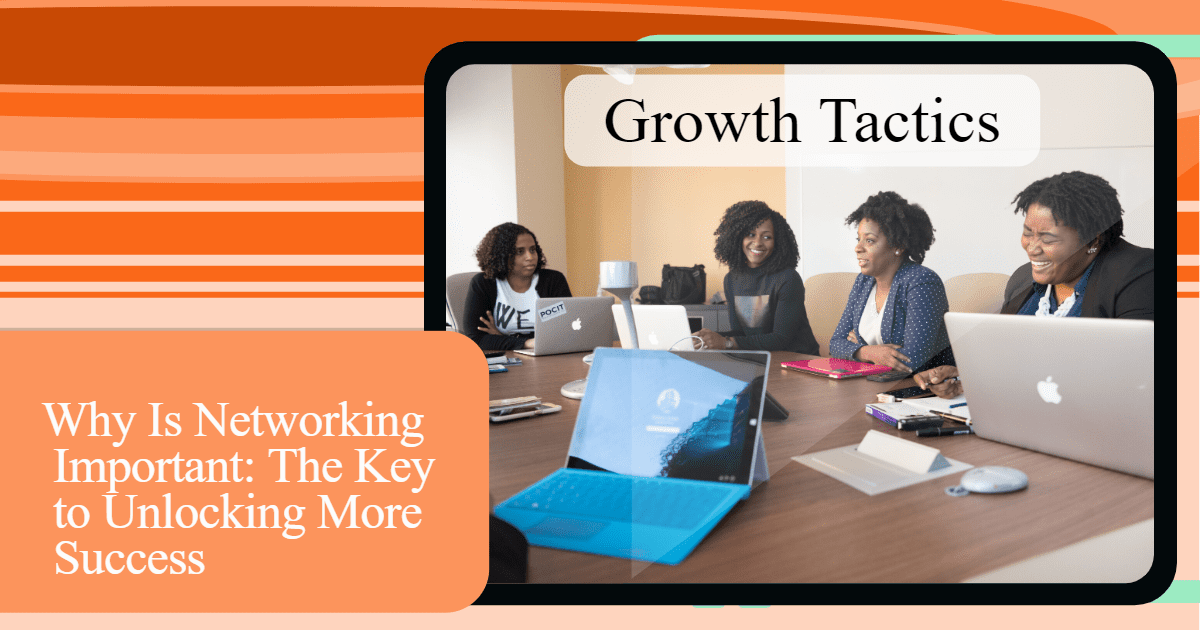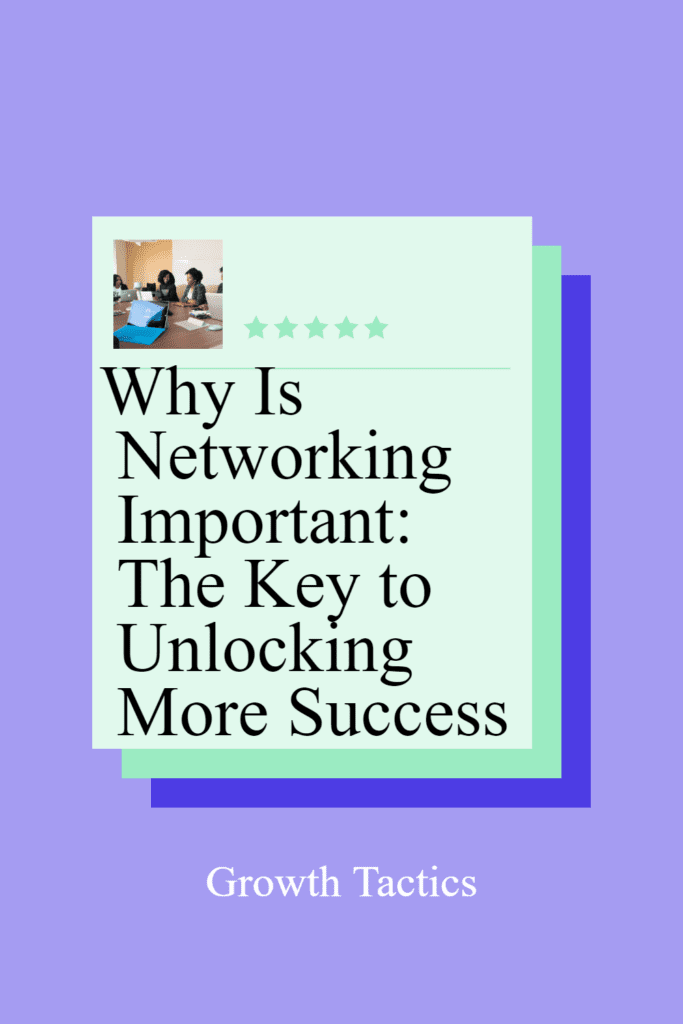In this article, we will delve into the numerous reasons why networking is important for both personal and professional growth. Not only will you discover the benefits of building a strong network, but you will also learn valuable tips and strategies to enhance your networking skills.
By the end of this article, you will be well-equipped with the knowledge and tools necessary to forge meaningful connections and unlock new opportunities, setting the stage for long-term success in your career and personal life.
Why is Professional Networking Important?

Building Valuable Connections
Professional networking is essential for creating a strong network of like-minded individuals. These connections can provide support, advice, and even job opportunities. By expanding your network, you increase your chances of finding the perfect job or partnership.
Access to New Opportunities
A well-connected professional network can open doors to new opportunities that you may not have discovered otherwise. Networking can lead to job referrals, collaborations, and even business partnerships. The more people you know, the more opportunities you have access to.
Learning from Others
Networking allows you to learn from the experiences and knowledge of others in your field. By connecting with professionals, you gain insights and advice that can help you grow and develop your own career. This exchange of information is invaluable in today’s competitive job market.
Personal Branding
Your professional network is an extension of your personal brand. By networking with others, you showcase your skills, knowledge, and personality. This helps build your reputation and credibility in your industry, making you more attractive to potential employers and clients.
Staying Current
In today’s fast-paced world, staying current with industry trends and news is crucial. Networking helps you stay informed by connecting you with professionals who share the latest updates and developments. This knowledge not only keeps you relevant but also helps you make informed decisions about your career.
Boosting Confidence
Networking can help boost your confidence by providing opportunities to practice your communication and interpersonal skills. As you engage with others, you become more comfortable discussing your accomplishments and goals. This increased confidence can translate into improved job interviews and business interactions.
Expanding Your Support System
A strong professional network serves as a support system when you face challenges in your career. Whether you need advice, encouragement, or a sounding board, your network can provide the resources and guidance necessary to overcome obstacles and achieve success.
By connecting with others, you gain access to valuable connections, opportunities, and knowledge that can propel your career forward. Don’t underestimate the power of networking. Start building your professional network today!
Where Should I Network?
Industry Events and Conferences
Industry events and conferences are a goldmine for networking opportunities. These gatherings bring together professionals from various backgrounds, providing an excellent platform to connect with like-minded individuals, exchange ideas, and learn about the latest trends in your field.
Local Meetups and Workshops
In-person meetups and workshops are great places to network with local professionals. These events often focus on specific topics, allowing you to engage in meaningful conversations and build connections with people who share your interests. Check out websites like Meetup.com to find events in your area.
Online Networking Platforms
LinkedIn is a powerful online networking platform for professionals. By creating a comprehensive profile and actively engaging with others, you can expand your network and connect with professionals in your industry. Additionally, joining LinkedIn groups and participating in discussions can help you establish your expertise and credibility.
Social Media
Social media platforms like Twitter, Facebook, and Instagram can also be valuable networking tools. By following industry influencers, participating in discussions, and sharing relevant content, you can connect with professionals and showcase your knowledge in your field.
Alumni Associations and Networking Events
Your alma mater can be a great networking resource. Many universities and colleges host alumni events and maintain online alumni communities, providing opportunities to connect with former classmates and other professionals in your industry.
Volunteer Work
Volunteering for industry-related organizations or events can lead to valuable networking opportunities. By offering your time and expertise, you not only contribute to a cause you’re passionate about but also meet other professionals who share your interests.
Networking Groups and Organizations
Joining professional organizations or networking groups can help you connect with professionals in your field. These groups often host regular events, workshops, and conferences, providing ample opportunities for networking and professional development.
By actively participating in industry events, online platforms, and local gatherings, you can expand your professional network and create valuable connections that can benefit your career. Remember, networking is an ongoing process. The more you put yourself out there, the more opportunities you’ll find.
With Whom Should I Network?

Peers and Colleagues
Networking with your peers and colleagues is essential for building a strong professional network. These individuals understand your industry and can offer valuable insights, advice, and support. Additionally, they may have connections to other professionals, opening up further networking opportunities.
Industry Experts and Influencers
Connecting with industry experts and influencers can help you stay up-to-date with the latest trends and developments in your field. These individuals often have extensive networks and can provide valuable introductions to other professionals, potentially leading to new opportunities.
Mentors and Advisors
Mentors and advisors can play a crucial role in your professional growth. Networking with experienced professionals who can offer guidance and support can help you navigate your career path more effectively. Plus, their connections can open doors to new opportunities.
Potential Employers and Clients
Networking with potential employers and clients can help you stay informed about job openings and business opportunities. By building relationships with these individuals, you increase your chances of being considered for future positions or projects.
Alumni and Former Classmates
Your alumni network and former classmates can be valuable resources for networking. These individuals often work in diverse industries and can provide connections to professionals you may not encounter otherwise. Plus, your shared educational background can serve as a strong foundation for building relationships.
People Outside Your Industry
Don’t limit your networking efforts to professionals within your industry. Connecting with people from different fields can provide fresh perspectives and ideas, which can be invaluable for your professional growth. Moreover, these individuals may have connections to opportunities that you wouldn’t have discovered otherwise.
Networking Group Members
Joining professional networking groups or organizations can help you connect with like-minded professionals who are also looking to expand their networks. These individuals can offer support, advice, and connections, making them valuable additions to your network.
By connecting with professionals from various backgrounds and industries, you can expand your network, gain new perspectives, and increase your access to opportunities. Remember, networking is about building relationships – focus on fostering genuine connections with those around you.
When Should I Start Professional Networking?

Start Early
The best time to start professional networking is as early as possible. Whether you’re a student, a recent graduate, or a seasoned professional, it’s never too soon to begin building connections. Networking early in your career can help you establish a strong foundation for future opportunities and growth.
During Your Education
While you’re still in school or pursuing further education, take advantage of networking opportunities available on campus. Attend career fairs, join clubs and organizations, and engage with your professors and classmates. These connections can be valuable resources as you transition into the workforce.
As You Enter the Workforce
As you begin your career, it’s crucial to continue building your professional network. Attend industry events, join professional organizations, and connect with your colleagues. These efforts will help you stay informed about job openings, industry trends, and potential collaborations.
During Job Transitions
When you’re in between jobs or considering a career change, networking becomes even more critical. By connecting with professionals in your desired field, you can learn about job opportunities, gain insights about the industry, and potentially receive referrals for open positions.
Throughout Your Career
Networking should be an ongoing effort throughout your entire career. By continually expanding your connections and staying engaged with your network, you increase your access to new opportunities, knowledge, and resources. Remember, networking is not just about finding a job – it’s about building relationships that can benefit both you and the professionals you connect with.
By actively engaging in networking activities early in your career and continuing these efforts throughout your professional journey, you can build a strong network that will support your growth and open doors to new opportunities. Don’t wait. Start networking today!
Tips to Get Good at Networking
- Set clear goals: Before attending networking events or engaging in online networking, determine your objectives. Are you looking for job opportunities, industry insights, or potential collaborations? Having clear goals will help you focus your efforts and make meaningful connections.
- Do your research: Prepare for networking events by researching the attendees, speakers, and topics. This knowledge will help you engage in relevant conversations and identify professionals you’d like to connect with.
- Perfect your elevator pitch: Develop a concise and compelling introduction that highlights your skills, experience, and goals. This elevator pitch will help you make a strong impression when meeting new people.
- Be approachable: Smile, maintain eye contact, and exhibit open body language to make others feel comfortable approaching you. A friendly demeanor will make it easier to initiate conversations and build connections.
- Ask open-ended questions: Engage in meaningful conversations by asking open-ended questions that encourage others to share their thoughts and experiences. This approach will help you learn more about the people you’re connecting with and establish rapport.
- Listen actively: Show genuine interest in the people you’re talking to by listening carefully to their responses and asking follow-up questions. Active listening demonstrates respect and helps build trust.
- Offer value: Share your knowledge, insights, or connections when appropriate. By providing value to others, you establish yourself as a valuable resource and encourage reciprocal support.
- Follow up promptly: After networking events, follow up with the people you connected with by sending personalized emails or LinkedIn messages. This follow-up demonstrates your interest in maintaining the relationship and helps solidify your connections.
- Stay organized: Keep track of your networking contacts by maintaining a spreadsheet or using a contact management tool. This organization will help you remember important details about your connections and make it easier to follow up.
- Be consistent: Networking should be an ongoing effort. Attend events regularly, engage with your online connections, and continually look for opportunities to expand your network.
- Be genuine: Authenticity is key when it comes to networking. Be true to yourself and your goals, and focus on building meaningful relationships rather than just collecting contacts.
- Practice patience: Networking success doesn’t happen overnight. Be patient and persistent in your efforts, and remember that the benefits of networking often come over time as your relationships grow and develop.
Final Thought on the Importance of Networking
In conclusion, networking is essential for personal and professional growth. It allows you to build meaningful relationships with diverse individuals who can offer valuable insights, advice, and opportunities. Networking not only helps you stay informed about industry trends and job openings but also fosters collaboration and innovation.
By investing time and effort into networking, you can expand your horizons, enhance your career prospects, and create a strong support system that will benefit you throughout your professional journey.
Did you enjoy this article on why is networking important? Please share and subscribe.


